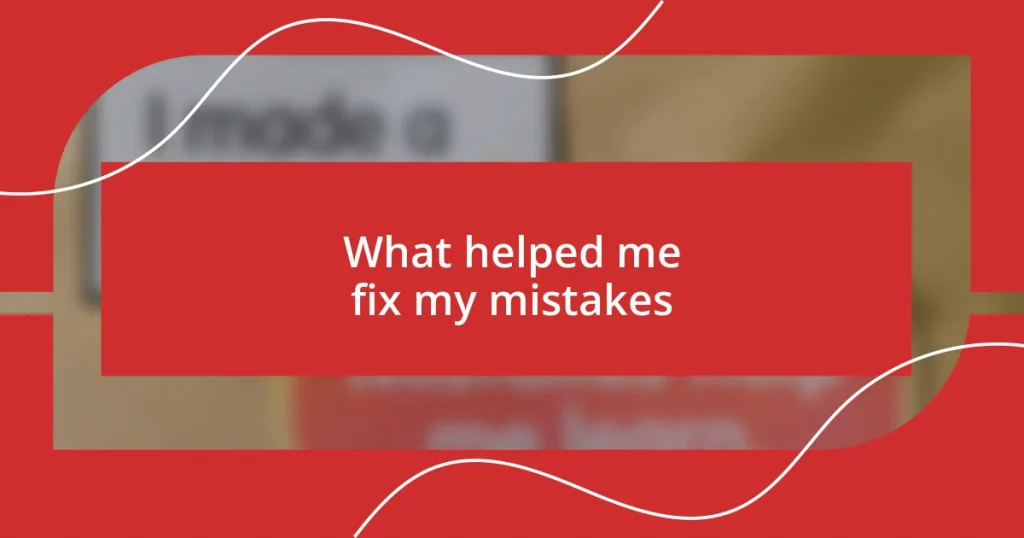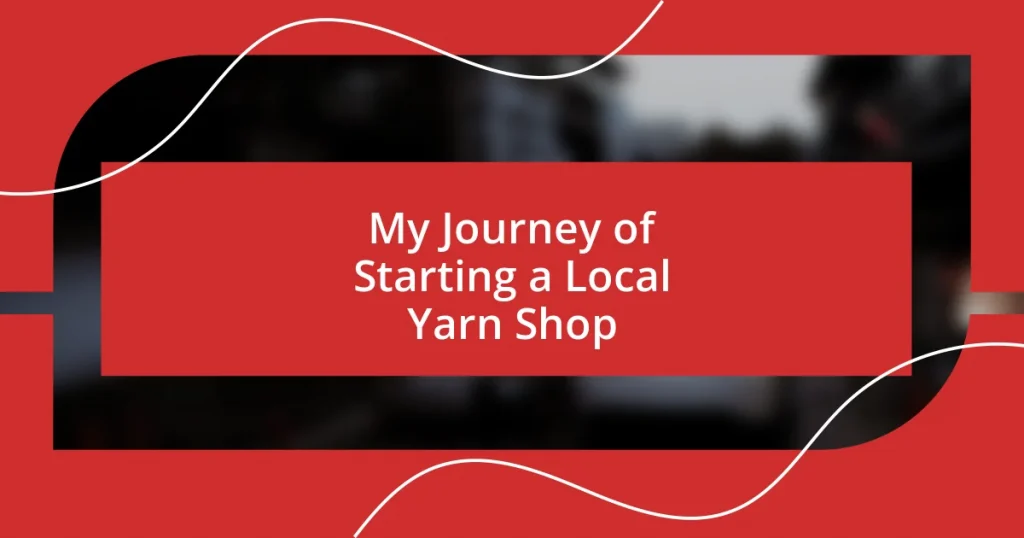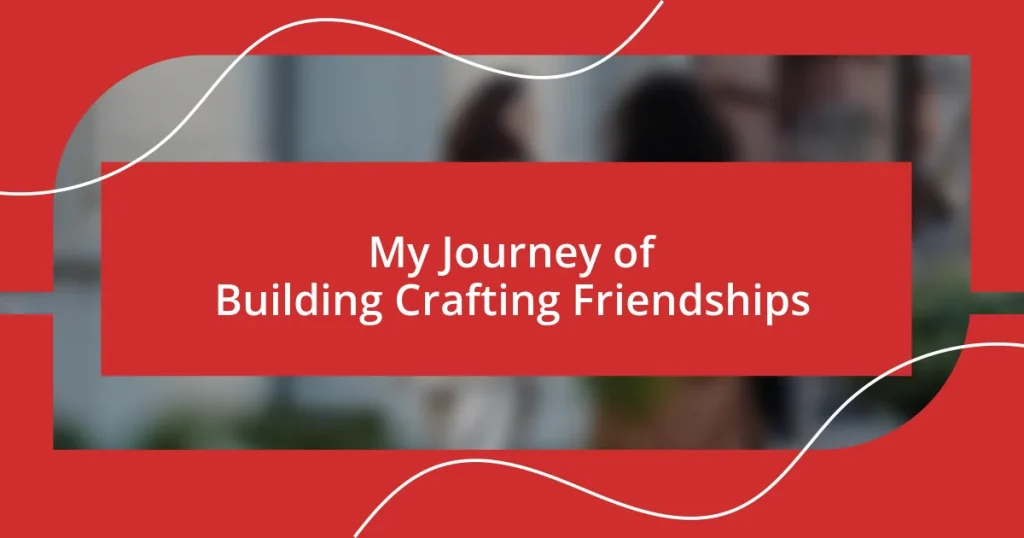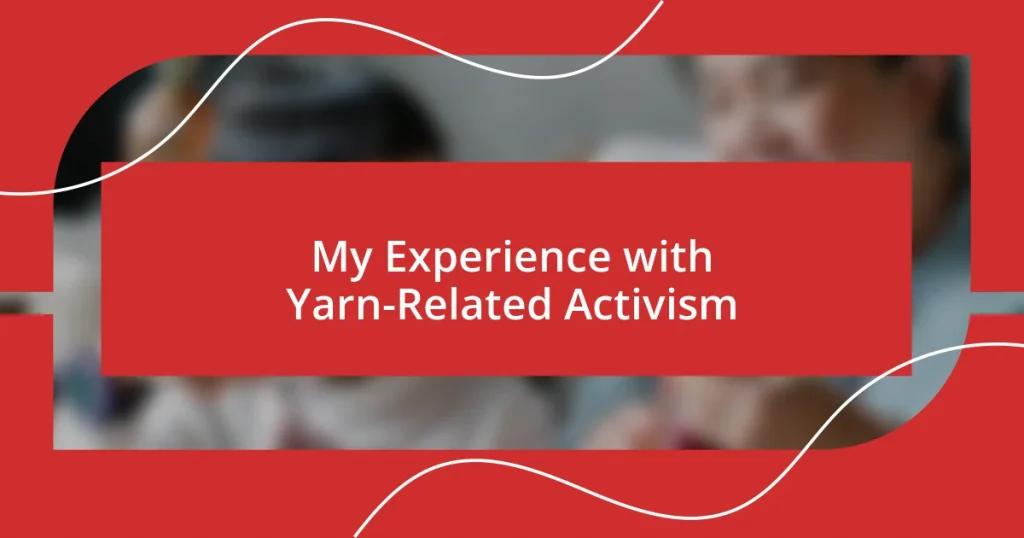Key takeaways:
- Keeping a journal and seeking feedback significantly enhance self-awareness and improve decision-making by identifying mistakes and blind spots.
- Understanding the impact of mistakes fosters personal growth, accountability, and stronger team dynamics through shared vulnerability and trust.
- Implementing effective action plans and celebrating successes reinforces a growth mindset, encourages collaboration, and motivates continuous improvement.
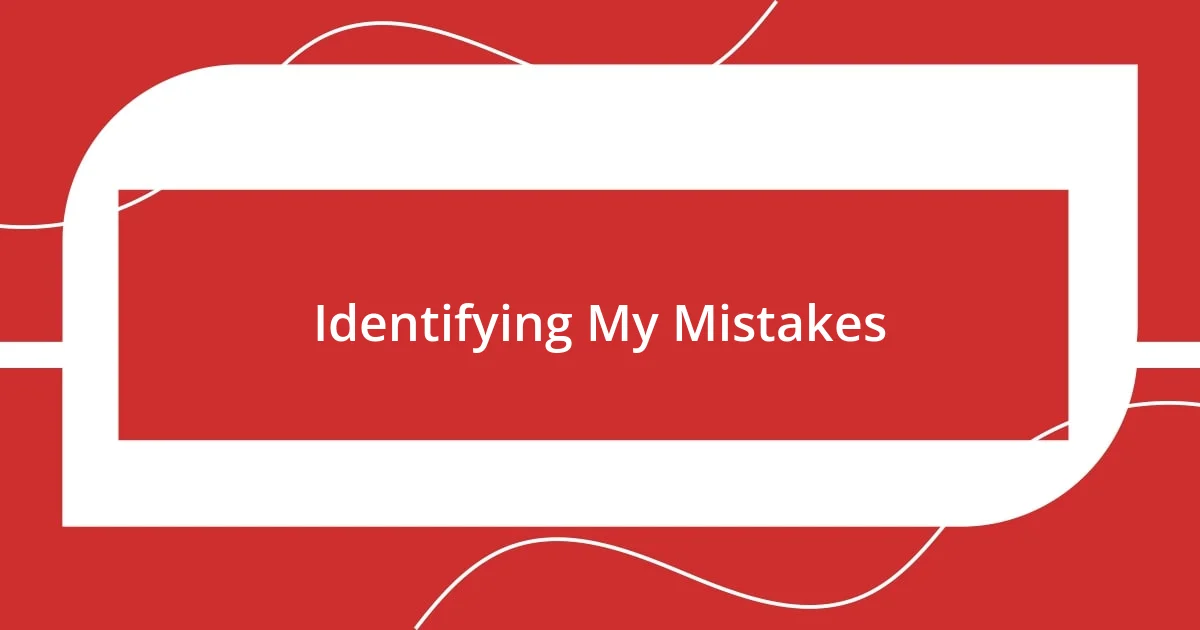
Identifying My Mistakes
Identifying my mistakes wasn’t always straightforward; it often felt like a daunting task. I vividly recall a project where I overlooked key deadlines. That experience made me ask myself, “How could I have avoided this?” Reflecting on my actions brought clarity to the chaos I’d created.
One significant turning point for me came when I started keeping a journal to analyze my decision-making process. I remember a time when I miscommunicated with my team, leading to confusion and frustration. Writing it down not only helped me understand where I went wrong but also emphasized the importance of clear communication. Have you ever felt that rush of regret? That’s a sign you’re on your way to recognizing your own patterns.
More recently, I’ve developed the habit of seeking feedback from others. This exchange often reveals blind spots that I might have missed. There was a time when a close colleague pointed out my tendency to jump to conclusions—something I hadn’t noticed. It was a humbling moment and truly highlighted how invaluable others’ perspectives can be in identifying our mistakes. How often do we dismiss the importance of external insights in our learning process? One conversation can be a game-changer.
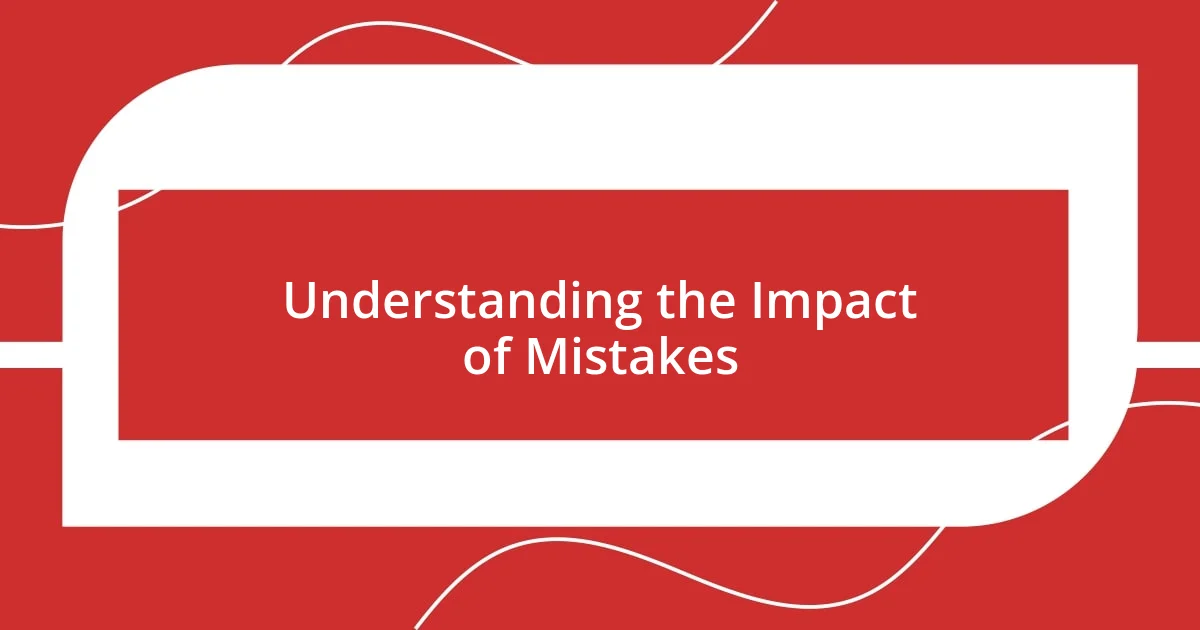
Understanding the Impact of Mistakes
Understanding the impact of mistakes can be quite enlightening. I remember a time when I failed to deliver a presentation, not due to lack of preparation, but because I ignored the audience’s interests. The feeling of disappointment washed over me; it made me realize how vital it is to reconnect with the people we are trying to engage. This single oversight taught me that mistakes are not just errors—they’re learning opportunities that allow us to grow.
In another instance, I mismanaged my time on a group task and put unnecessary pressure on my teammates. The stress I witnessed them experiencing served as a wake-up call. What struck me was not just the error itself, but the ripple effect it created on the group’s dynamics. This experience drove home the point that our mistakes can affect others deeply, making it crucial to take responsibility and recognize our impact on those around us.
Interestingly, each mistake I’ve encountered has shaped my perspective about failure. There’s a certain vulnerability that comes with admitting when we’ve erred, but I also discovered that vulnerability fosters connection. I recall a project manager shared the story of their major hiccup in front of the team, and while it was uncomfortable, it also made us feel like we were all in this together. That shared experience built trust—and trust is essential for collaboration.
| Type of Impact | Description |
|---|---|
| Personal Growth | Learning to embrace mistakes facilitates self-improvement and resilience. |
| Team Dynamics | Errors can disrupt group harmony, highlighting the need for accountability and communication. |
| Connection | Sharing vulnerability through mistakes encourages trust and camaraderie among peers. |
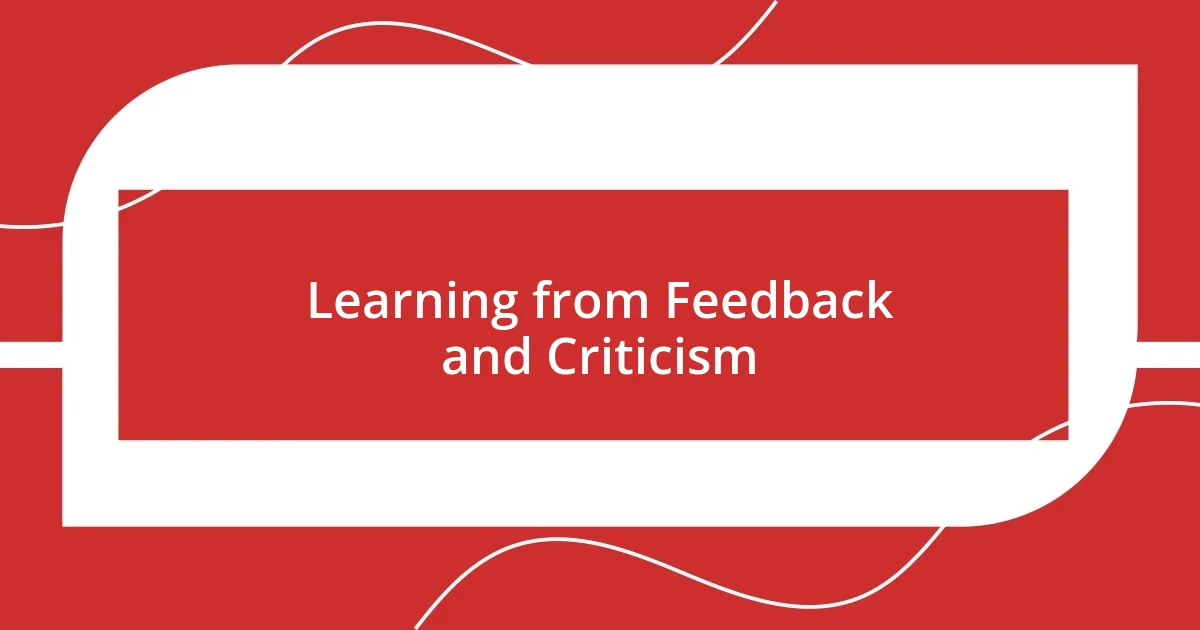
Learning from Feedback and Criticism
I’ve learned that feedback and criticism are among the most vital tools in my growth process. I once presented a project proposal to my team, eagerly anticipating praise. Instead, I received a range of constructive criticism that initially stung. However, as I absorbed their insights, I felt a shift within me—it transformed my defensiveness into curiosity. Learning to ask the right questions allowed me to sift through the comments, pinpointing exactly where I could improve. It’s as if a light bulb turned on, illuminating pathways to better my craft.
Here’s what I gather from my experiences with feedback and criticism:
- Emotional Resilience: Accepting feedback can be uncomfortable, but it ultimately builds a thicker skin against future challenges.
- Growth Mindset: Embracing criticism has nurtured a mindset where I see potential improvements rather than shortcomings.
- Value of Diverse Perspectives: Each piece of feedback offers unique insights; it’s crucial to listen actively and not dismiss differing opinions.
Reflecting on these insights has been my revelation. I’ve come to realize that welcoming outside opinions—especially when they challenge my thinking—has been the catalyst for significant improvement in my work and personal growth.
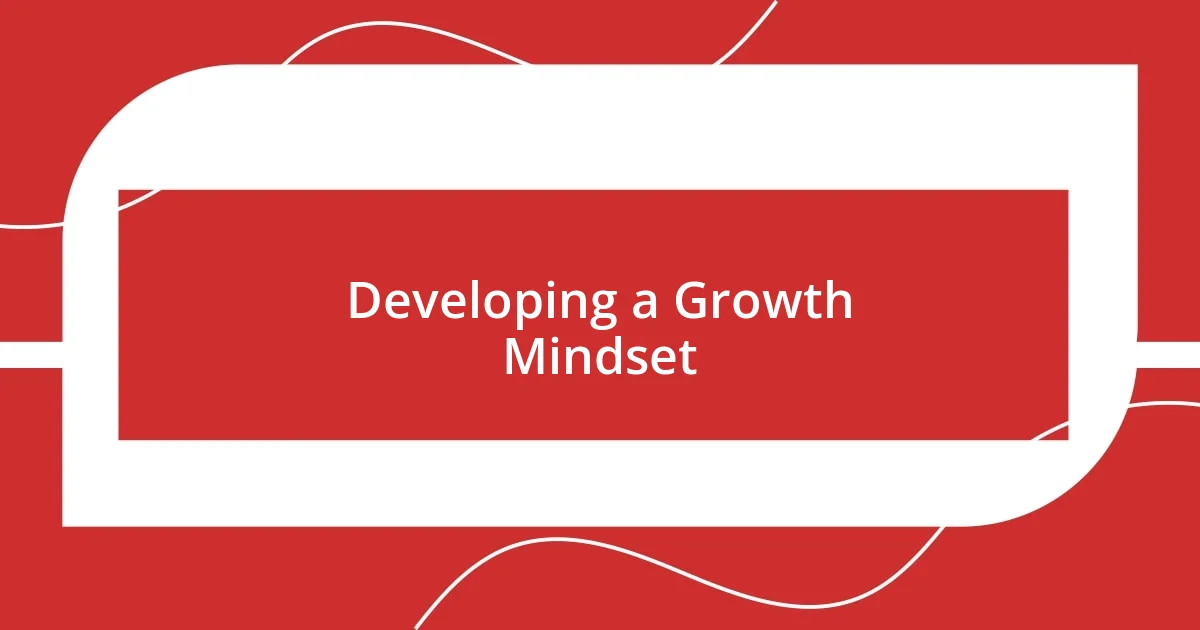
Developing a Growth Mindset
Cultivating a growth mindset has been a transformative journey for me. I vividly recall a time when I was hesitant to tackle a complex project, fearing I wouldn’t measure up. However, a mentor shared a crucial insight: every expert was once a beginner. This helped me shift my perspective. Instead of viewing challenges as threats, I started seeing them as chances to expand my skill set. Isn’t it fascinating how a simple mind shift can open up new possibilities?
I also learned the importance of persistence in the face of obstacles. One challenging day, I felt overwhelmed when facing a particularly tricky problem that seemed insurmountable. But instead of giving up, I took a step back, reassessed my approach, and broke the issue into smaller, manageable tasks. Each step forward brought a sense of achievement, reinforcing my belief that persistence truly pays off. Have you ever experienced that thrill of overcoming a challenge you once thought was beyond your reach?
I find sharing my growth experiences to be equally beneficial. For instance, in a team meeting, I once openly discussed my past failures and the lessons I learned from them. This revelation not only encouraged my colleagues to share their own stories but also created a collective atmosphere of learning. We all realized that mistakes don’t define us; rather, they help us to refine our approaches and foster a culture of continuous improvement. How powerful is it to turn those initial failures into collaborative learning opportunities?
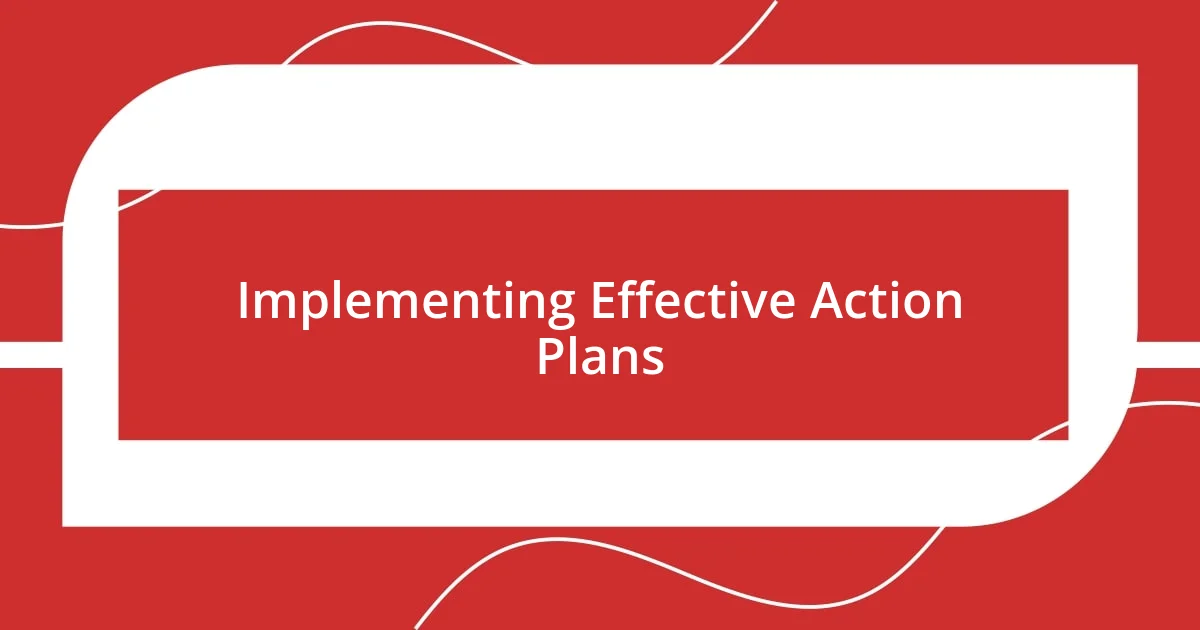
Implementing Effective Action Plans
When it comes to implementing effective action plans, I’ve found that the key lies in breaking tasks down into actionable steps. For instance, during a team project, we once faced a daunting deadline that seemed impossible. Instead of scrambling at the last minute, we sat down to outline our objectives, assigning specific roles and deadlines. This clarity fostered accountability, and I noticed how much smoother our workflow became. Don’t you think having a clear roadmap helps reduce anxiety and boosts productivity?
Another vital aspect I’ve learned is the importance of regular check-ins. Early in my career, I neglected this element, thinking it would simply slow down our progress. I quickly realized that monitoring our advancements and making adjustments as needed was crucial for keeping everyone on the same page. There was this moment during one project when a slight miscommunication nearly derailed our efforts. However, a quick team huddle clarified our paths forward, ultimately leading to a successful outcome. How often do you reflect on your progress, and have you considered how that can influence your journey?
Furthermore, celebrating small wins along the way has been a game changer for me. I remember after completing a significant milestone on my action plan, I shared the success with my team through a casual meeting. We took a moment to reflect on our efforts, which fostered a sense of unity and motivation. Acknowledging these little victories not only strengthens team morale but also encourages continuous engagement with our goals. Don’t you feel that taking a moment to appreciate progress keeps the momentum going?
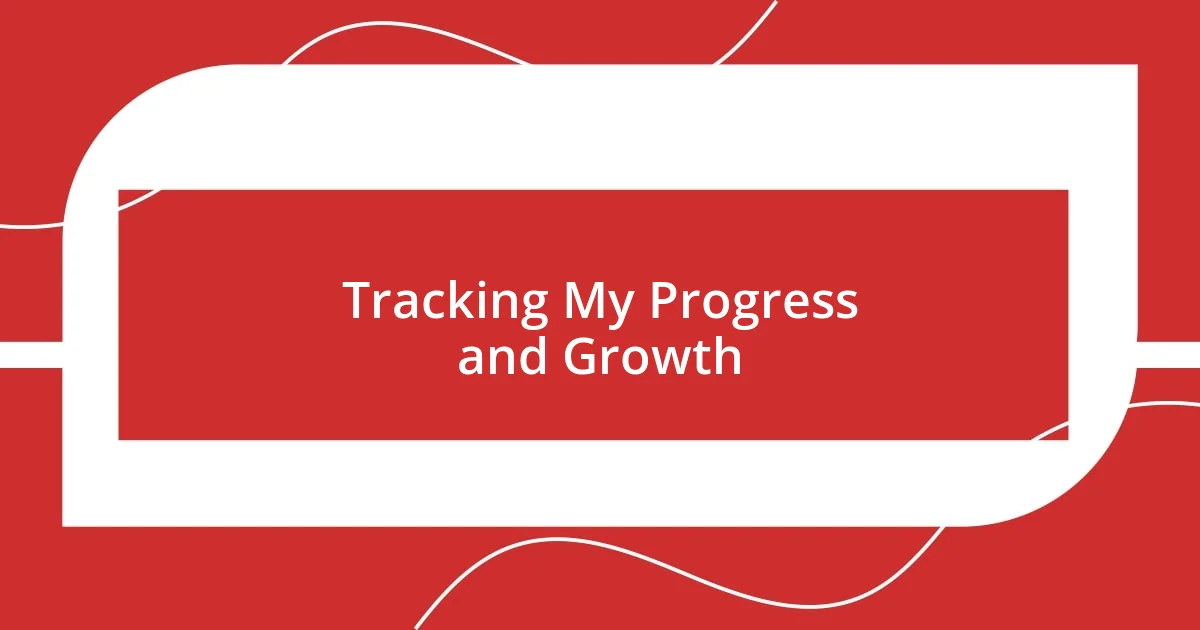
Tracking My Progress and Growth
Tracking my progress has been an enlightening experience. I remember starting a new project and feeling completely lost at first. I decided to maintain a journal where I logged daily reflections on what went well and what didn’t. Each entry allowed me to see my growth over time, and revisiting those pages often brought me joy. Have you ever seen your journey captured in words and felt that rush of pride in your achievements?
Another important aspect has been setting measurable goals. In one instance, I aimed to improve my presentation skills. I broke this goal down into weekly targets—practicing in front of a mirror, recording myself, and seeking feedback from colleagues. As weeks passed, I could vividly see my confidence growing, and my enthusiasm to present turned into something I actually looked forward to. Isn’t it amazing how small, consistent efforts can lead to significant transformations?
I’ve also learned that sharing my progress with others adds layers to my growth. For example, I initiated a monthly check-in with a mentor, where we reviewed my successes and areas for improvement. It was during these conversations that I discovered new insights and strategies that I hadn’t even considered. How about you? Have you found that external validation and support amplify your own progress in ways you didn’t expect?
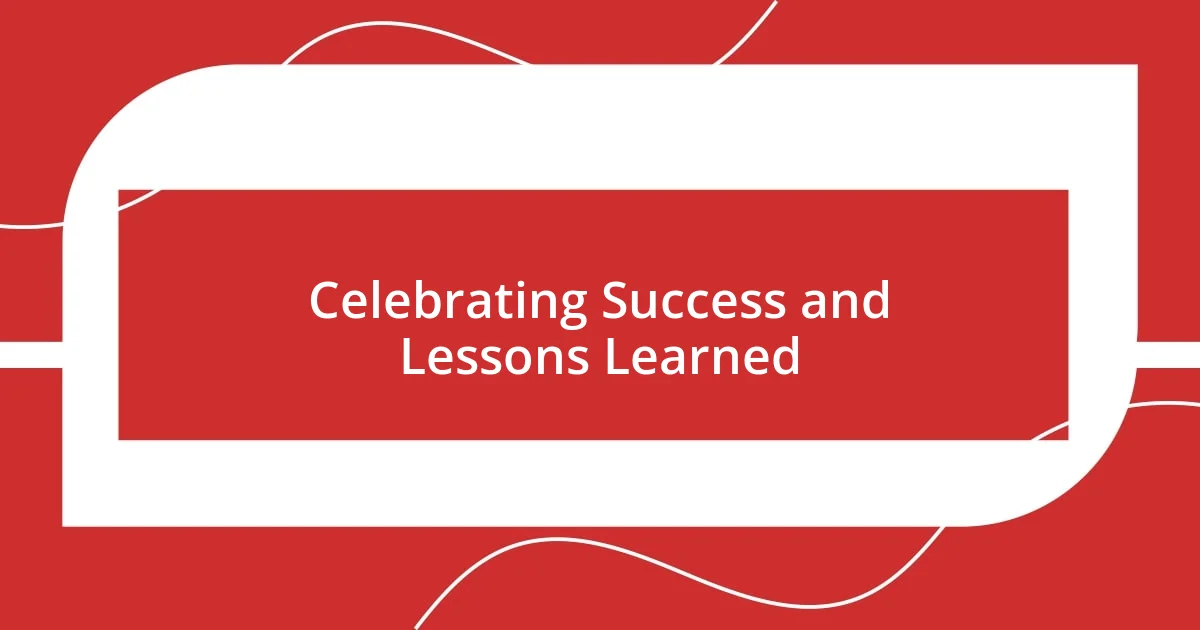
Celebrating Success and Lessons Learned
Celebrating success can be a powerful motivator, and I noticed this firsthand during a recent project completion. After finishing a particularly challenging assignment, we threw a small celebration to recognize everyone’s contributions. As we shared stories about the hurdles we overcame, I realized how much these moments strengthen our bond as a team. Don’t you think that acknowledging achievements can create a positive ripple effect?
Reflecting on the lessons learned is equally important for me. I can recall a time when my initial plan flopped, leading to significant setbacks. Instead of viewing that as a complete failure, I took a step back to analyze what went wrong. By doing so, I discovered valuable insights that informed my approach for future projects. How often do we take the time to dissect our experiences for the greater good?
Over time, I’ve come to view both successes and failures as integral parts of my journey. I often remind my team that every setback is a lesson in disguise. The last time we faced this, one of my teammates proposed a “lessons learned” session after finishing a project. We shared our individual takeaways, which not only highlighted our collective growth but also cultivated an environment of trust and collaboration. Have you ever participated in something like that? It might just transform how we see challenges!










